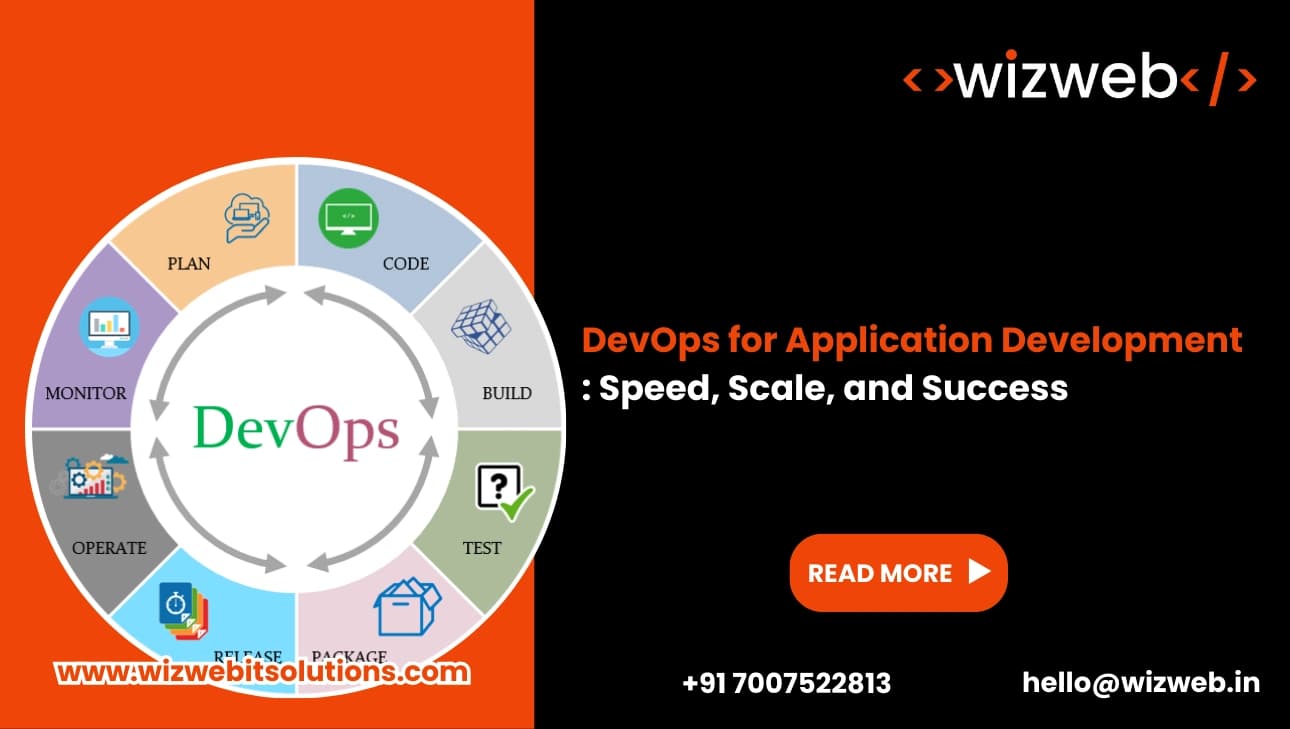Get in Touch
- Phone
+91 700 752 2813
- Email Now
hello@wizweb.in
Office No - 204 A-140, Sector 63 Road Noida, Uttar Pradesh 201301

In today’s fast-moving digital world, every business wants to deliver high-quality applications quickly. The faster you can launch and improve your software, the more chances you have to stay ahead of the competition. This is where DevOps for Application Development becomes very helpful. It changes how development teams work and improves the results they can deliver.
Whether you are building websites, web apps, or mobile apps, DevOps for Application Development can make your team work better, faster, and smarter. It brings together developers and operations teams so they can build, test, and release apps more smoothly and without delays.
DevOps for Application Development is a modern approach that combines software development (Dev) and IT operations (Ops). It helps teams deliver new features, fix bugs, and update apps more often—and with better quality.
In traditional development, teams work in silos. Developers write the code, and once done, the operations team handles the deployment. This often leads to delays, miscommunication, and bugs. But with DevOps for Application Development, both teams work closely together from the start of the project until the end. This saves time and reduces errors.
Using DevOps for Application Development can completely change the way your team builds and delivers software. Let’s explore how it helps your business:
Without DevOps, software development can take months or even years. With DevOps, teams can launch features in weeks, days, or even hours. This is because the development and operations teams work as one unit. They fix problems early and automate many steps in the process, so things move faster.
DevOps for Application Development isn’t just about speed—it also means better quality. Developers add testing right into the coding process. This helps catch bugs early before they become big problems. Automated testing tools can test each update to make sure it meets the right standards.
If you’re doing DevOps for mobile app development, this means fewer app crashes, better performance, and happier users.
When your app becomes popular and more people start using it, you need to scale it smoothly. DevOps helps you do that. It uses tools like cloud services and infrastructure as code (IaC) to make this easy.
This means your team can add more servers or storage in minutes—not days—based on what your app needs. You don’t have to do it all manually anymore.
To make DevOps work for your team, you need to follow a few important practices:
In CI, developers regularly add their code to a shared project. Automatic tests run every time new code is added. This catches problems early and makes sure the app works well with each new update.
For mobile teams, CI helps make sure the app works on many different devices and operating systems.
CD makes it easy to release updates quickly and safely. Once the code is tested, it can go live without manual steps. In mobile apps, this might mean automatic uploads to app stores or direct updates to users.
IaC means writing scripts to set up the infrastructure (like servers and databases). This makes it fast and error-free to build, test, or deploy apps.
In mobile apps, you can use IaC to quickly build the backend systems that support your app and make sure everything runs the same way every time.
Once your app is live, it’s important to keep an eye on how it’s working. Monitoring tools show how users interact with the app and how it performs.
If you’re using DevOps for mobile app development, this could mean tracking app crashes, loading times, or battery usage. It helps your team find and fix issues quickly.
Mobile apps come with their own set of problems—different devices, screen sizes, operating systems, and user behaviors. DevOps for Application Development helps solve these challenges in smart ways:
With so many devices out there, it’s hard to test your app on each one manually. DevOps uses automated testing tools to check your app on different platforms quickly. This ensures all users get the same smooth experience.
Sometimes, app stores take time to approve new updates. DevOps helps speed up this process by automating submissions and using feature flags. Feature flags let you turn features on or off without needing to send a new version of the app.
DevOps allows your team to gather user feedback and fix issues fast. If users complain about a feature, you can fix it and release an update quickly—sometimes on the same day.
You don’t have to make big changes all at once. You can start small and grow step by step. Here’s how to begin your DevOps for Application Development journey:
The world of DevOps is growing. Here are a few trends that are making it even more powerful:
These trends make DevOps for Application Development even more helpful and important in today’s tech world.
DevOps for Application Development is not just a buzzword—it’s a powerful way to build better apps faster. It helps teams work together, reduce errors, and deliver updates quickly.
Whether you are creating a web app or using DevOps for mobile app development, adopting this approach will improve your process and the experience you give to users. As more companies turn to digital solutions, DevOps for Application Development will continue to be an essential part of success.